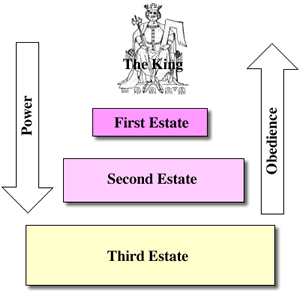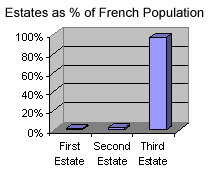Lesson Two: The Origins of Western Democratic Liberalism
6. Lesson 3.2.5 Liberal Ideas on Political Systems
Classical Liberal Ideas about Political Systems

Before the late 1700s, in feudal Europe of the past, most people lived in the same area in which they had been born. They did the same work as their parents. Most Europeans were poor and uneducated. The chance that their quality of life would improve was very small. They lived a very traditional way of life with very few individual rights. There was a definite class system in which a very small number of powerful people made and enforced the rules-often for their own benefit.
For example, before the French Revolution of 1789, France had a feudal class system, which had been in place for many centuries. Everyone belonged to one of the three classes of French society called estates. The majority of people occupied the lowest class or Third Estate. Most of of the Third Estate were classified as peasants. They did not have any legal rights. Rules were made by the monarch.
Please watch the following video explain the French Revolution

The Estate System

Estates as a % of the French Population
Feudal French Class System
The French monarch inherited most of the power and did not have to obey or respect the law. The King had any rights and freedoms he wanted. France was his kingdom.
The First Estate was made up of the clergy. The Roman Catholic clergy had many rights and freedoms. They did not pay taxes, and they owned much land. The clergy had some say in how they were governed.
The Second Estate was made up of the nobility. They had many rights and freedoms. They did not pay taxes, and they owned most of the land. The nobility had some say in how they were governed.
The Third Estate was made up of peasants, workers, and merchants. This group made up 97% of the population. They were the poorest people in France, and yet, they paid all the taxes. The Third Estate had very few individual rights and freedoms. They had absolutely no say in how they were governed. There was little hope that their lives would ever change.
The class systems of other European kingdoms at this time were very similar to that in France.However, with the Enlightenment, society did begin to change. New ideas about individual rights and freedoms were explored by the great thinkers such as Locke, Rousseau, and Hobbes. These ideas began to spread and would be shared by thousands of people around the world. Gradually, ideas about people having a say in government made their way into government policies. Eventually, this led to the liberal democracies of today in Europe, North and South America, and many other parts of the world.